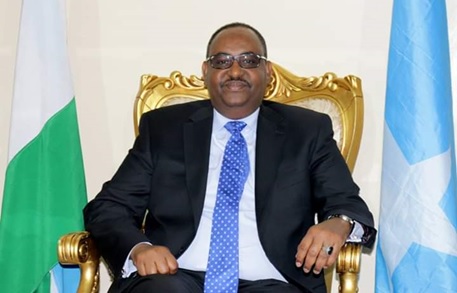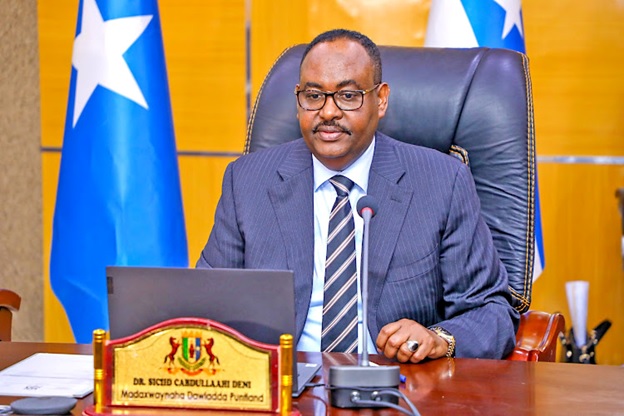By Mohamed Abdiqafar H. Hussein
The democratization process and the implementation of the one person one vote (OPOV) system in Puntland, despite being enshrined in the constitution since the establishment of the state in 1998 and enjoying widespread public support, has yet to materialize fully. Upon assuming leadership of Puntland State, President Said Abdullahi Deni pledged to execute and complete the democratization process during his term. While he has delivered on his promise to conduct local council elections based on a multi-party system, various obstacles have cast a shadow over Puntland’s democratic evolution.

Challenges include a lack of consensus between the government and opposition regarding the pathway to democratic transition. Additionally, the limited time remaining for the current government to implement the OPOV system has presented practical difficulties. This discord has intensified the conflict between the government and the opposition, making it challenging for them to reach a consensus on electoral processes.
In a speech President Deni delivered recently on his plan to address the growing dispute between his government and the opposition, the first part of the president’s speech, in which he asked the opposition group to come to the negotiation table, was good, and focused on a number of issues that all Puntlanders would agree, but it was in the concluding part that the president stated what he really had in mind, as he stressed that all Puntlanders want a one person, one vote election system; and urged that the people are tired of the old system where traditional elders select parliamentarians who then elect the president and the vice president.
President Deni emphasized in his address that Puntland cannot withstand internal conflict at this critical juncture, underscoring that events from the past are unalterable. He urged Puntlanders to actively engage in a negotiation process and deliberate on the path ahead. Notably, President Deni went as far as inviting those in the audience to act as arbitrators overseeing the discussions between his team and the opposition group.
President Deni stated that he would accept the outcome of the negotiation, even if it went against his preferences. The key to allowing Puntlanders to choose their desired leader, he emphasized, lies in adopting a one person, one vote election system. This statement seemed sincere, with some interpreting it as a positive shift, especially given his prayers for peace in Puntland and unity among its people.
However, this apparent openness to negotiation took an unexpected turn when President Deni,
in his capacity as the chairman of the Kaah Party and president of Puntland, abruptly abandoned the encouragement of negotiation and consensus. He declared a rigid stance, asserting that no election system other than one person, one vote would be permitted under his leadership. This sudden change of position raised questions about his commitment to a collaborative and inclusive electoral process.
President Deni asserted that both the audience and the wider Puntland community are eager for a democratic election, emphasizing its constitutional legitimacy. While stating his intention to convince those who oppose him to reconsider, the president did not specify a time or place for negotiations. This lack of clarity and arrogance suggests a lack of sincerity to engage a genuine negotiations, indicating a preference for advancing his agenda through the newly established Puntland Election Commission (PEC).
The local council election that took place on May 25, 2023, a closed list system was used, where political associations submit the list of their candidates, and only the top names in the list have the greatest chance of being elected. The limitation of this system is that the public don’t have the option of electing their own candidates. The people vote for a party that lists 10 individuals for each party. If a party wins four seats, then the first four persons the party listed would win. So, people have no choice; but the party leaders, instead of the traditional elders select the candidates for the people. Nothing much has changed from the old system where traditional leaders had the power of choosing for the people. And now the president wants to hold a fake election, where the only candidates are the president and his groomsmen.
The crux of the matter requiring discussions and negotiations is the one person, one vote process, which has deviated from the correct path since its inception. With President Deni’s term set to conclude in less than two months, there’s an apparent effort to portray the opposition as resistant to the one person, one vote election process, contrary to their actual stance. The opposition contends that the president initiated the election process on the wrong footing, resuming it after his unsuccessful bid for the presidency of Somalia. This perspective underscores the need for a comprehensive dialogue to address the procedural concerns surrounding the election process before Feb 8.
The total number of registered voters, including those who took part in phase I for the early elections only four hundred thousand people were registered, and a little over one hundred seventy thousand people voted. The registration process was mobile, which led to problems. For example, the registration team was in Bossasso for a few weeks only before it moved on to the next districts; many people in that city did not get an opportunity to register to participate in the election, especially as registration was stopped almost five months before the election took place.
According to Article 12 of the Puntland constitution only the three political parties that get the most votes shall be legalized. President Deni has changed the constitution to include and accommodate all eight of the original political associations would be legalized parties of Puntland. This gave the president control over the members of the PEC. As a result, the majority of PEC members are members of the president’s Kaah Party.
The local councils who were elected on May 25 were not seated almost for five months after they were supposedly elected. This was because the parties were still negotiating how they would share the seats, without considering which party had won the most votes. Even the president himself said that he allowed other parties who did not win to share seats and nominate mayors, to diversify his winning party. This manipulation of the democratization process was not acceptable to the Puntlanders, most of whom are against it and see it as illegal.
Some people support the president, thinking he advocates for “one person, one vote,” although that is not the case. Concurrently, the impending expiration of President Deni’s five-year term is a pressing concern. The opposition group has long been aware of the challenges surrounding a fair election, particularly after the president’s return from Mogadishu. Despite consistent denials, there is a prevailing suspicion that the president aims to extend his term. Recently, the Puntland Election Commission (PEC) extended his term by a little over two months, setting the election date for February 25, 2024. This move has heightened tensions and raised questions about the fairness of the electoral process.
Still, the opposition group believes this is the first of many extensions in the pipeline. All of the other Puntland presidents decided to issue an annex, allowing the same election for which they were elected to be held when they realized they could not accomplish “one person, one vote” within their term. The opposition group has already called on President Deni to issue that annex since his government cannot hold a “one person, one vote” election whose processes are agreed upon by all stakeholders; President Deni ignored it.
President Deni remains reluctant to address neither the validity of “one person, one vote” nor the approaching end of his presidential term. Instead, he wants to make it an issue about those who oppose him not wanting people to elect whom they want, which would make sense to those who do not understand the real issues.
If the president is serious about the election process to progress in the best interest of Puntland, he must acknowledge the reasons why other stakeholders have not endorsed his approach. To prevent a potential power vacuum, it is imperative for the president to engage in negotiations before his term concludes. A genuine willingness to converse with the opposition and an openness to accepting the preferences of Puntlanders would pave the way for resolving these pressing issues. However, if the president persists in the belief that his current misguided course is correct, no peaceful solution is on the horizon. A sincere commitment to dialogue and flexibility in addressing the concerns raised by various parties is crucial for achieving a peaceful and acceptable solution.
Mohamed Abdiqafar Haji Hussein
Email: mohabdhus@gmail.com
Atlanta, Georgia.


Leave a Reply